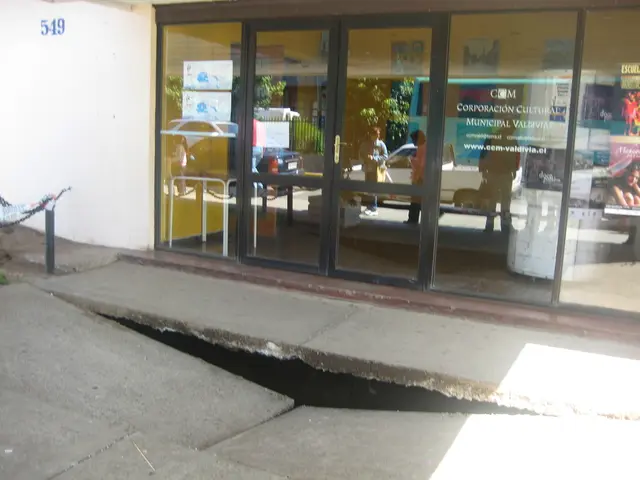A Tragic Gas Leak in Farm Worker Accommodation - Lives Lost in East Westphalia
Accommodation for harvest workers experiences fatal gas leak, resulting in two fatalities - Catastrophic gas leak in temporary worker dormitory: Regrettably, two individuals succumb to their injuries.
There's a grim tale unfolding in East Westphalia, where a gas leak in a residential building housing Romanian farm workers has claimed the lives of a 19-year-old woman and a 23-year-old man. According to the latest reports from the doctor and authorities, the incident occurred at Höxter.
With a total of 23 occupants, three people were reported with minor injuries from the gas, while the rest were luckily evacuated safely thanks to emergency services.
Invesigators are currently scrutinizing a potential culprit – a malfunctioned heater. The fire department's findings reveal dangerously high levels of carbon monoxide in the air. A police spokesperson said, "We strongly suspect a technical glitch, possibly originating from the heater."
The entire building has been cordoned off, and the question remains: Was this a tragic accident, or did neglect play a role? The authorities have initiated an investigation on suspicion of negligent homicide against unidentified individuals.
Gas Leaks and Their Causes
Gas leaks, particularly those related to heaters, often stem from various factors. Common causes include:
- Faulty gas heaters – with issues like malfunctioning thermostats or burners[3].
- Improper installation of pipework – due to unqualified personnel or insufficient supervision during installation.
- Old or corroded pipework – causing leaks when not inspected regularly.
- Incorrect usage of heaters – for example, blocking ventilation or incorrect adjustments of safety features.
- Neglecting safety regulations – disregard for guidelines and regulations for the installation and operation of gas heaters.
Keep in mind that these insights are for your information only and do not necessarily apply to the incident in East Westphalia.
Prevention is Key
To prevent gas leaks, it is imperative to ensure that all gas appliances, such as heaters, are installed and maintained by certified professionals. Regular inspections and adherence to safety protocols are essential to minimize risks.
In light of the tragic gas leak in a farm worker accommodation in East Westphalia, it's crucial to delve into community policy regarding vocational training for professionals in the technical field, such as gas heater installation and maintenance. Such training could prevent accidents like the one in Höxter, where a malfunctioned heater might have led to the death of two individuals and injuries to others.
Understanding the various causes of gas leaks, including faulty gas heaters, improper installation, old or corroded pipework, incorrect usage, and neglect of safety regulations, can help communities take preventive measures. Vocational training programs could aim to educate technicians on these issues to ensuregas safety.
In addition, the importance of regular inspections, adherence to safety protocols, and maintaining up-to-date knowledge about gas and appliance safety should be emphasized in any comprehensive policy to prevent gas leaks, accidents, and potential violations of health-and-wellness standards.
By prioritizing vocational training and safety regulations, communities can strive for a future where accidents like car-accidents, general news headlines, and even incidents involving mental-health issues due to stress or trauma are minimized. In essence, our efforts should focus on proactive fitness-and-exercise for prevention and emergency preparedness, as part of the science of creating safer communal living spaces.








